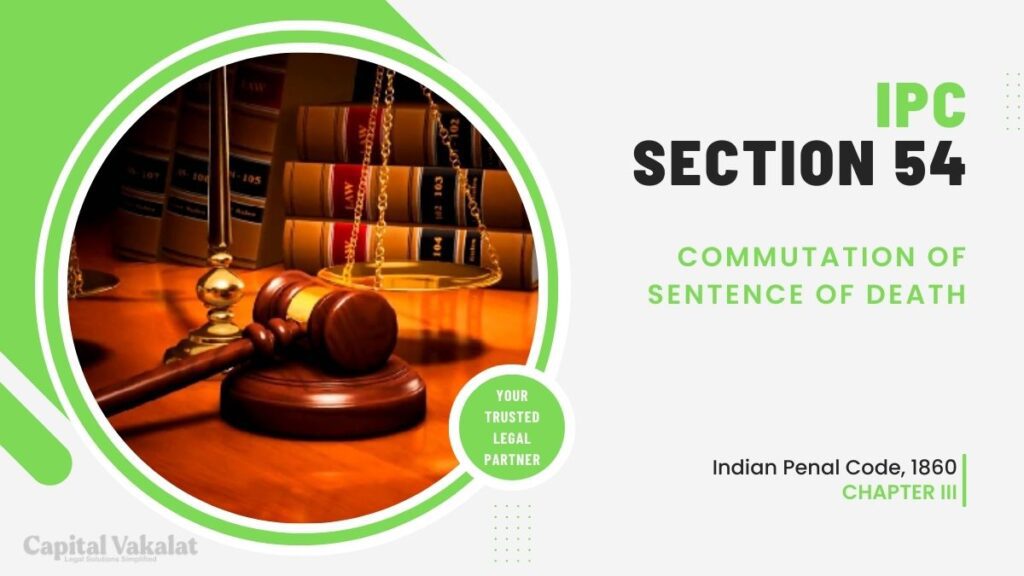In the intricate world of law and justice, Section 54 of the Indian Penal Code (IPC) holds significant importance. This particular section deals with the commutation of the sentence of death.

In this article, we will delve deep into the nuances of Section 54 IPC, exploring its provisions, implications, and the broader context in which it operates.
Understanding the Indian Penal Code
Before we delve into Section 54, let’s first understand what the Indian Penal Code is. The IPC is the official criminal code of India, originally drafted in 1860. It serves as the foundation of criminal law in the country and covers a wide range of offenses, from theft to homicide.
The Purpose of Sentencing
Sentencing in criminal cases is a critical aspect of the justice system. It aims to achieve multiple objectives, including punishment, deterrence, reformation, and protection of society. However, when it comes to the death penalty, the stakes are exceptionally high, and there is room for reconsideration under certain circumstances.
What is Section 54 IPC?
Section 54 of the Indian Penal Code deals explicitly with the commutation of a sentence of death. Commutation, in legal terms, means the reduction of a punishment to a less severe one. In the case of the death penalty, it involves changing the sentence to life imprisonment.
Grounds for Commutation
Under Section 54 IPC, there are specific grounds on which the sentence of death can be commuted. These grounds include:
Mental Illness
If the convict develops a severe mental illness after being sentenced to death, it becomes a compelling reason for commutation. The justice system recognizes that mentally ill individuals may not fully comprehend the gravity of their actions.
Pregnancy
In cases where a female convict is pregnant, the death sentence can be commuted. The idea is to protect the unborn child and not subject them to the consequences of the mother’s actions.
Youthfulness
Youthfulness at the time of the crime is another factor considered for commutation. The argument here is that young offenders may have a higher potential for reform and rehabilitation.
Delay in Execution
Protracted delays in the execution of the death penalty can also be a ground for commutation. Prolonged incarceration on death row can be considered a form of mental and emotional torture.
Legal Process for Commutation
The process for commutation under Section 54 IPC involves several stages. It typically starts with a formal application by the convict or their legal representatives. This application is reviewed by higher authorities, including the state government and the President of India.
International Perspectives
It’s essential to note that the commutation of the death penalty is not unique to India. Many countries around the world have similar provisions in their legal systems. This reflects a global acknowledgment of the need for humanity and compassion, even in cases of heinous crimes.
The Ongoing Debate
The topic of the death penalty and its commutation remains a subject of heated debate in India and worldwide. Advocates argue that it’s a necessary deterrent for serious crimes, while opponents question its moral and ethical implications.
Conclusion
In conclusion, Section 54 IPC plays a pivotal role in the Indian legal system by allowing for the commutation of the death penalty under specific circumstances. It underscores the importance of considering factors such as mental health, pregnancy, youthfulness, and delays in the execution process. While the debate on the death penalty continues, this section ensures that justice is tempered with compassion and humanity.
FAQs
How long does the commutation process usually take?
The duration can vary, but it often involves a thorough review and can take several months to complete.
Are there any international treaties that India is a part of regarding the death penalty?
Yes, India is a signatory to international conventions that discourage the use of the death penalty.
Does commutation mean the convict will be released from prison?
No, commutation typically involves a reduction of the sentence to life imprisonment, not release.
What is the role of the President of India in the commutation process?
The President has the authority to pardon or commute death sentences based on recommendations and legal considerations.